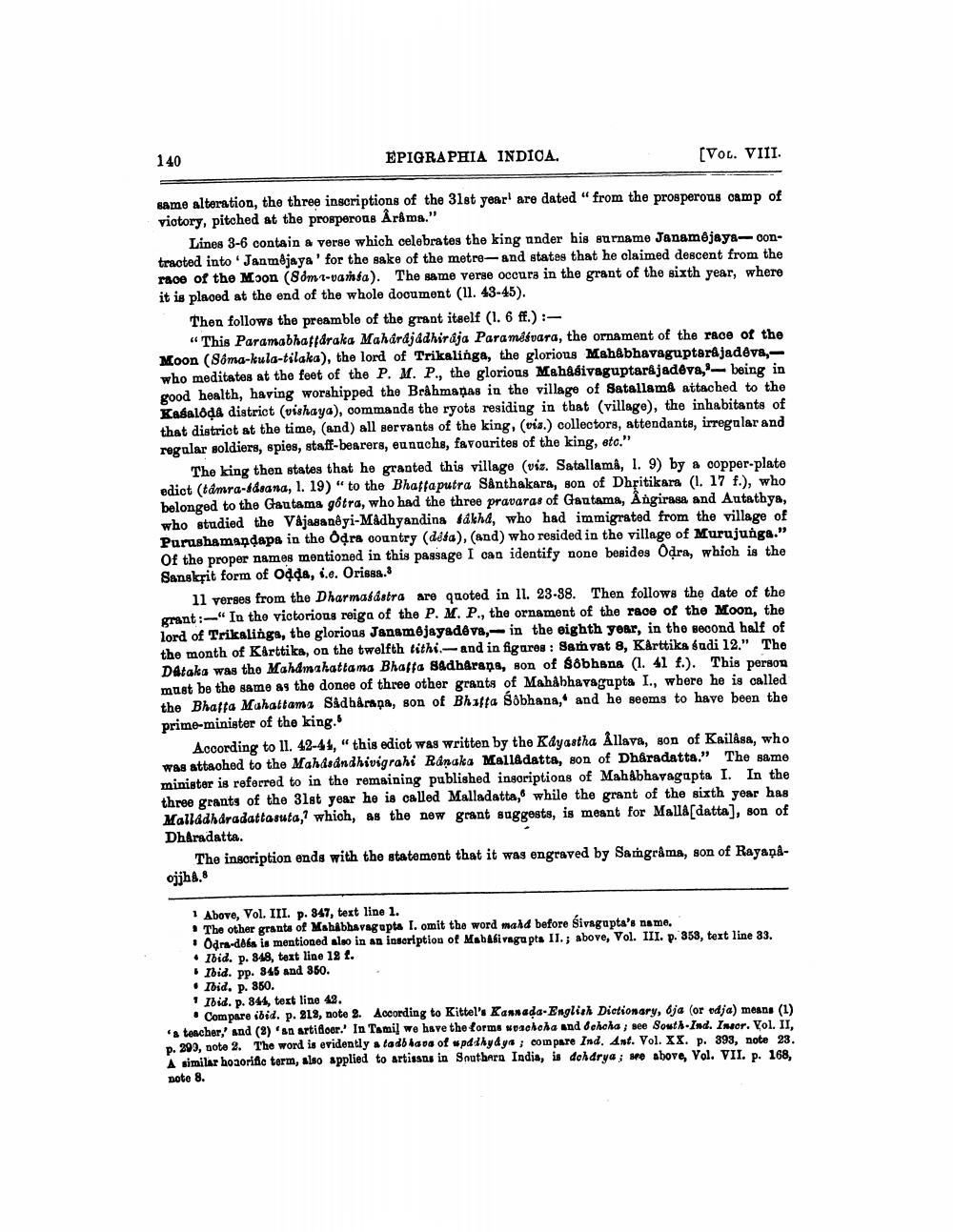________________
140
EPIGRAPHIA INDICA.
[VOL. VIII.
same alteration, the three inscriptions of the 31st year are dated" from the prosperous camp of victory, pitched at the prosperous Arama."
Lines 3-6 contain a verse which celebrates the king under his surname Janamêjaya- ontracted into Janmējaya' for the sake of the metre- and states that he claimed descent from the race of the Moon (80m 1-vanta). The same verae occurs in the grant of the sixth year, where it is placed at the end of the whole document (11. 43-45).
Then follows the preamble of the grant itself (1. 6 ff.) :
"This Paramabhaffaraka Mahárdjádhiraja Paramédvara, the ornament of the race of the Moon (8ôma-kula-tilaka), the lord of Trikalinga, the glorious Mahâbhavaguptarâjadeva,who meditates at the feet of the P. M. P., the glorious Mahasivaguptarjadáva, being in good health, having worshipped the Brahmaņas in the village of Satallamå attached to the KasalodA district (vishaya), commands the ryots residing in that (village), the inhabitants of that district at the time, (and) all servants of the king, (via.) collectors, attendants, irregular and regular soldiers, spies, staff-bearers, eunachs, favourites of the king, etc."
The king then states that he granted this village (viz. Satallama, l. 9) by a copper-plate edict (tamra-doana, 1. 19) "to the Bhattaputra Sånthakara, son of Dhritikara (1. 17 f.), who belonged to the Gautama gôtra, who had the three pravaras of Gautama, Angirasa and Autathya, who studied the Vájasanêyi-Madhyandina fákhd, who had immigrated from the village of Purushamandapa in the Oąra country (déta), (and) who resided in the village of Murujunga.” Of the proper names mentioned in this passage I can identify none besides Odra, which is the Sanskrit form of Odda, i.e. Orissa.
11 verses from the Dharmasastra are quoted in Il. 23-38. Then follows the date of the grant:-"In the victorious reiga of the P. M. P., the ornament of the race of the Moon, the lord of Trikalinga, the glorious Janamêjayadeva,- in the eighth year, in the second half of the month of Karttika, on the twelfth tithi and in figares : San vat 8, Kårttiks sudi 12." The Dataka was tho Mahdm ahattama Bhafta Sadh&rans, son of Sobhana (1. 41 f.). This person must be the same as the donee of three other grants of Mahabhavagupta I., where he is called the Bhafta Mahattam. Sadharana, son of Bhafta Sobhana, and he seems to have been the prime-minister of the king.
According to II. 42-44, "this edict was written by the Kdyastha Allava, son of Kailasa, who was attached to the Mahasandhivigrahi Ranaka Malladatta, son of Dháradatta." The same minister is referred to in the remaining published insoriptions of Mahabhavagapta I. In the three grants of the 31st year he is called Malladatta, while the grant of the sixth year has Malladhdradattasuta," which, as the new grant suggests, is meant for Malla[datta], son of Dharadatta.
The inscription ends with the statement that it was engraved by Sargråma, son of Rayaņaojjha.
1 Above, Vol. III. p. 847, text line 1. • The other grants of Mahabhavagapta I. omit the word mand before Sivagupta's name, • Odra-daba is mentioned aloo in an inscription of Mabasivaga pts II. ; above, Vol. III. p. 353, text line 33. • Ibid. p. 348, text line 19 1.
Ibid. pp. 846 and 850. • Ibid. p. 850.
Ibid. p. 844, text line 42. . Compare ibid. p. 818, note 2. According to Kittel's Kannada-English Dictionary, 6ja (or edja) means (1) s teacher,' and () an artifloor.' In Tamil we have the forms spachoha and Gehehasee South Ind. Insor. Vol. II, p. 299, note 2. The word is evidently a tadblada of wpddhydyo ; compare Ind. Ant. Vol. XX. p. 393, note 23. A similar honorific term, also applied to artisans in Southern India, is doldrya; mo above, Vol. VII. p. 168, note 8.




